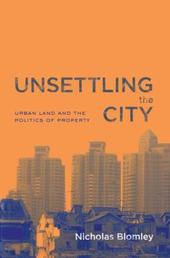
|
Unsettling the City: Urban Land and the Politics of Property
Paperback
Main Details
| Title |
Unsettling the City: Urban Land and the Politics of Property
|
| Authors and Contributors |
By (author) N.K. Blomley
|
| Physical Properties |
| Format:Paperback | | Pages:256 | | Dimensions(mm): Height 229,Width 152 |
|
| Category/Genre | Human geography
Regional geography |
|---|
| ISBN/Barcode |
9780415933162
|
| Classifications | Dewey:333.337 |
|---|
| Audience | | Professional & Vocational | | Tertiary Education (US: College) | | General | |
|---|
| Illustrations |
8 line drawings and 8 b&w photographs
|
|
Publishing Details |
| Publisher |
Taylor & Francis Ltd
|
| Imprint |
Routledge
|
| Publication Date |
11 December 2003 |
| Publication Country |
United Kingdom
|
Description
How is the legal conception of 'property' working to eradicate the global urban commons? Contemporary capitalism has advanced this process by producing rampant gentrification, socio-spatial stratification, and racial inequality. In Unsettling the City , Nicholas Blomley shows how the concept of 'property' helps to generate and underwrite these pervasive urban processes. But they are not uncontested. Showing how conflicting concepts of property are implicated in a host of social struggles in the contemporary city, he begins his study with the Pacific Northwest. From this base, Blomley moves to Pacific Rim cities in general, looking at gentrification, urban land, and postcolonialism in the Western US, Australia, and Western Canada - areas where one can see the stark collision between Western, neoliberal notions of property and the more egalitarian, communal view espoused by recently displaced (yet still present) native cultures. Unsettling the City is an expansive analysis of how "property" plays a key role in what he terms "the enclosure of the global commons," and what can be done to resist this process of enclosure.
Reviews"This book makes a compelling argument for the importance of understanding the ways that hegemonic understandings of property underwrite gentrification and urbanism more generally. But it also unsettles our understanding of private property by elaborating a plethora of already-existing examples that reside somewhere between public and private: from ocean waves to community gardens. Blomley makes a powerful argument about the expansionary potential of community property rights and gives us compelling conceptual tools for fighting hegemonic meanings of property. This book is a wonderful antidote to the 'death of public space' literature, which is not only depressing but debilitating."
-Geraldine Pratt, University of British Columbia and co-editor of "Dictionary of Human Geography
"A book on urban domestic and commercial property ownership is long overdue in critical geography. In "Unsetting the City, Blomley skillfully shows us how urban land is controlled legally, but also ordinarily: an obvious geography we rarely appreciate with much theoretical depth. This fine book interrogates that banality of owning urban land through critiques of capitalism and liberal democracy, showing us just how powerful and diffuse this--literally--'political geography' is to maintaining injustice and inequality in the city."
-Michael Brown, University of Washington and author of "RePlacing Citizenship: AIDS Activism and Radical Democracy
..."a significant contribution to a multiperspectival understanding of the important Vancouver experience..""
no.145
-BC Studies, The British Columbia Quarterly, Spring 2005
|